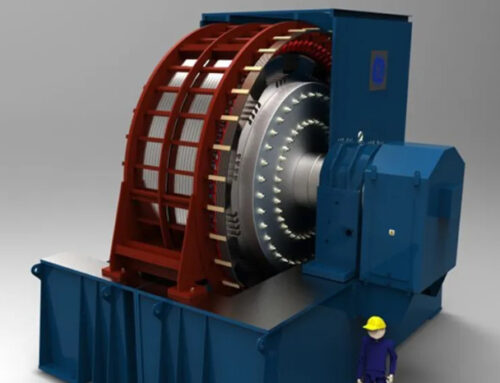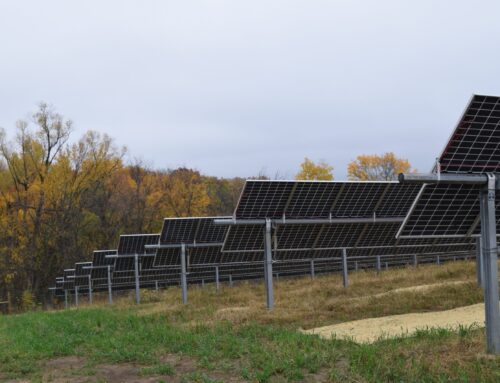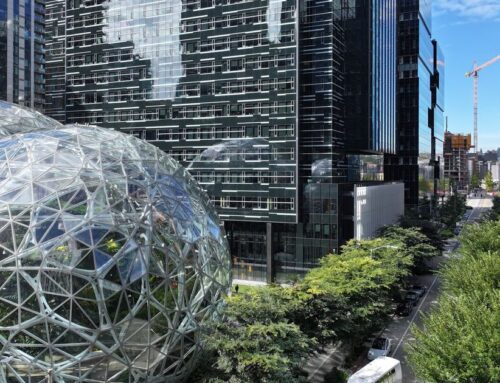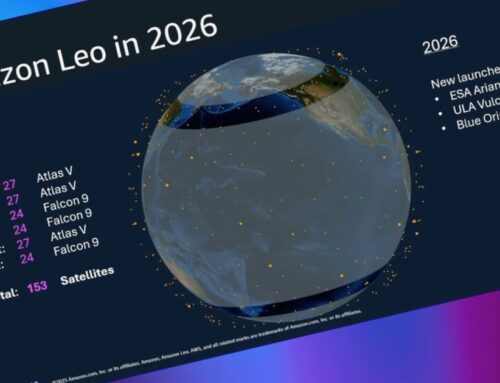GOP cuts to clean energy tax credits would deal a blow to Michigan, businesses warn
May 16, 2025
Republicans in Congress have called them “waste,” “handouts” and “green boondoggles.”
Some business leaders in Michigan say that couldn’t be further from the truth for billions in federal incentives fueling advanced manufacturing, clean energy and consumer purchases of rooftop solar systems or electric vehicles — now all on the chopping block.
That’s because Republicans in Washington have begun to make good on President Donald Trump’s campaign promises to gut his predecessor Joe Biden‘s signature climate law, the 2022 Inflation Reduction Act.
In Michigan, their efforts have prompted industry and environmentalists to launch full-court press to save a sweeping set of tax credits available under the law. It’s not just their green appeal. Yanking them away would force layoffs, boost household energy costs and stifle economic growth, they contend.
“That’s essentially an energy tax hike on Michigan families, and it’s happening just as new energy projects are beginning to deliver real savings and job opportunities in our state,” said Laura Sherman, president of the Michigan Energy Innovation Business Council, an industry group for the advanced energy sector.
‘Big, Beautiful Bill’ extends tax cuts, slashes climate incentives
The hubbub comes as GOP leaders on Capitol Hill unveiled a plan this week to sunset many Biden-era clean energy tax credits. They’re attempting to slash enough of the federal budget to extend tax cuts implemented Trump’s first term, set to expire at the end of this year.
The cuts make up what they’ve dubbed “The One Big, Beautiful Bill,” enacting Trump’s agenda, which has put the Inflation Reduction Act in the crosshairs, alongside changes to Medicaid and federal food assistance.
They frame ending the tax credits as a means to hold “woke elites” accountable, saying the plan would reduce taxes an average of $1,300 for many American families. It must advance through a byzantine process known as “budget reconciliation,” used to pass most major policy in recent years because it requires only a simple majority vote in the Senate. Democrats used it to pass the Inflation Reduction Act along party lines.
The package is likely to shift as it moves through Congress, and some Senate Republicans have expressed reservations about abruptly axing the tax credits.
In Michigan, business leaders lobbying to save clean energy incentives argue they actually support a critical pieces of Trump’s agenda, ensuring a strong domestic energy supply and growing domestic manufacturing jobs amid foreign competition.
“I can tell you for sure that the tax credits we‘ve received and our customers have received are not a boondoggle,” said Kevin O’Connell, advanced energy systems manager at Michigan CAT, which sells Caterpillar equipment in the state.
His company has used federal incentives to install combined heat and power systems, generators that offer high efficiency and reduced emissions by capturing heat that would otherwise be wasted.
“These are systems going into hospitals, commercial buildings – critical to our communities, not just some rich person’s green power, or however they want to characterize it,” he said.
Auto industry invested with ‘essential’ tax credits
They’ve supported the state‘s “signature industry” — its automotive sector — as it navigates a shift toward electric vehicles, according to Glenn Stevens, executive director of MichAuto at the Detroit Regional Chamber.
Across the globe, it’s now not a question of when that change will happen but how fast, he said. Chinese automakers are leading the way, and the tax credits are helping American counterparts respond, standing up a critical domestic supply chain for new battery technologies, according to Stevens.
“What’s been put forth by the previous administration, and the things that are in question right now, we think are absolutely essential to Michigan’s future,” he said.
While EVs have become highly politicized, they can’t remain that way if American automakers want to compete globally, Stevens said.
Independent analyses have shown that more than 75% of the low-carbon energy investments driven by the Inflation Reduction Act are taking place in Republican House districts. Industry leaders say they’re hoping to convince GOP representatives of the dire consequences of cutting off the incentives.
“I would say that there is not a legislator on the federal side that is not aware of the projects in their districts that could be impacted by this,” Stevens said. “It’s too big an issue. It has been too transformational to not just the (auto) industry but manufacturing in their districts.”
Congressional Republicans’ plan could not just phase out tax credits but claw back unspent money supporting advanced technology vehicle manufacturing. Biden-era grants have flowed to Michigan projects like GM’s efforts to revamp a Lansing plant for EV production.
There are signs not all Republicans will get behind the changes. One Michigan Congressman, Republican John James, representing a Metro Detroit district, in March signed onto a letter with 20 GOP colleagues urging fellow Republicans to protect some tax credits.
“As energy demand continues to skyrocket, any modifications that inhibit our ability to deploy new energy production risk sparking an energy crisis in our country, resulting in drastically higher power bills for American families,” the letter read.
Representatives for James didn’t respond to a request for comment from MLive on Thursday, May 15.

Cory Morse | cmorse1@mlive.com
EV, solar incentives at risk
Worry about the future of the Inflation Reduction Act extends to incentives available directly to households. The GOP plan would all but end tax credits for electric vehicle purchases, home energy efficiency upgrades and rooftop solar installations by the end of the year.
That will only put those steps out of reach for many, especially low-income households, according to Komal Doshi, vice president of electrification and mobility with Detroit-based Walker-Miller Energy Services, a firm that helps businesses and communities reduce energy usage.
“Without the support, many businesses and families will be forced to delay critical upgrades, leading to higher utility bills and continued reliance on outdated and inefficient systems,” she said.
Environmental groups also worry the rollbacks could bring the nation’s carbon emission reductions to a standstill, halting progress in fighting climate change.
“Make no mistake, this bill takes a sledgehammer approach,” a coalition of the groups, including Sierra Club and Earthjustice, wrote to GOP leaders in a letter this week.
Michigan still has its own climate targets, including the requirement that utilities ramp up reliance on renewable energy, that remain in effect even as the Trump administration dismantles Biden‘s climate policy in Washington.
But taking away incentives that help utilities establish solar farms, wind parks and grid-scale batteries would only make getting there more expensive.
DTE Energy, the state’s largest electric utility, is advocating the tax credits be preserved, according to a statement from spokesperson Jill Wilmot.
“The benefits of these credits flow through directly to utility customers’ electric bills, so eliminating or significantly reducing the credits will impact affordability for electric customers everywhere — including in Michigan,” Wilmot said.
Brian Wheeler, a spokesperson for Consumers Energy, the state’s second largest power provider, declined to take a position on the rollbacks, saying in a statement the utility was reviewing them and was focused on keeping costs affordable while developing a diverse energy portfolio.
The affordability to smaller-scale solar arrays could also suffer, according to John Jevahirian, vice president operations at Michigan Solar Solutions, which installs panels and backup batteries on homes and businesses.
Tax incentives for household solar installations — some dating back to the George W. Bush administration and extended by the Inflation Reduction Act— have allowed his firm to employ more workers, and they’re often the deciding factor in getting customers to invest, he said.
“Our Congressional delegation has a choice,” Jevahirian said. “They can defend these investments, or they can jeopardize Michigan’s momentum just as it’s gaining speed.”
Sign up to receive Lake Effect, MLive‘s weekly climate and environment newsletter.
Search
RECENT PRESS RELEASES
Related Post




